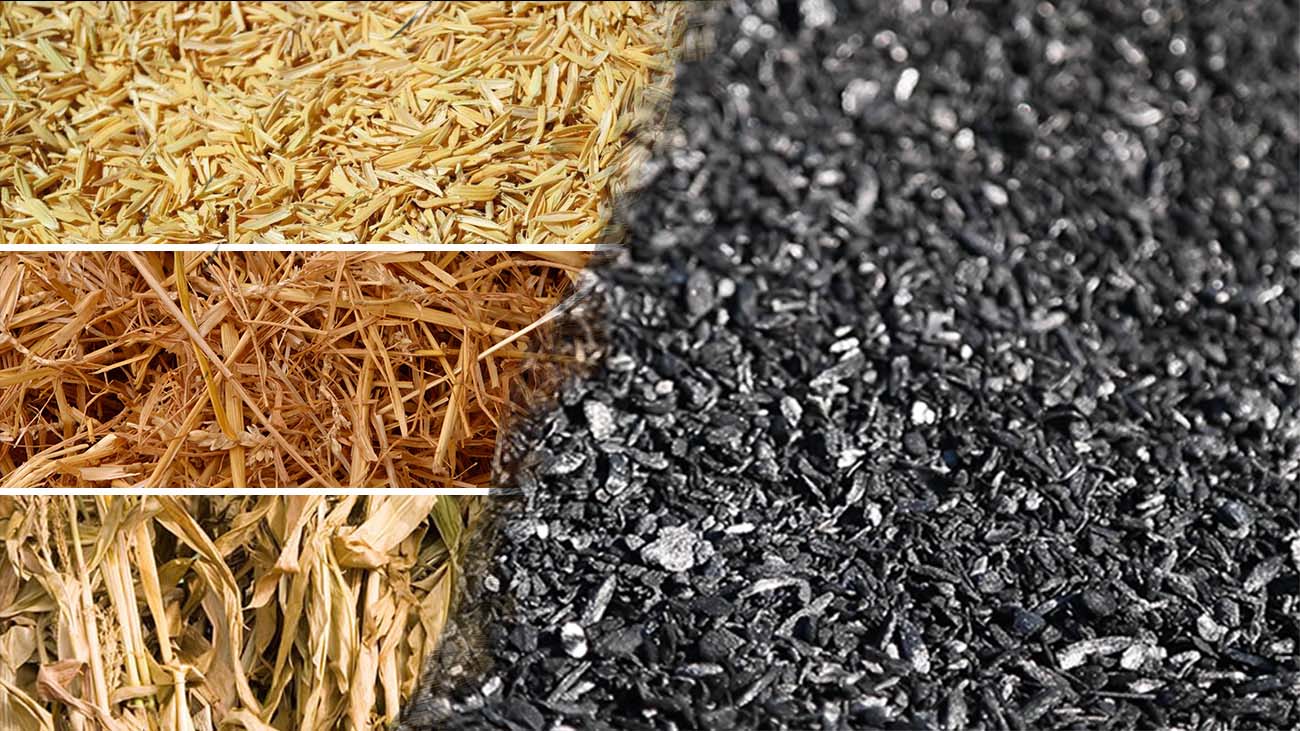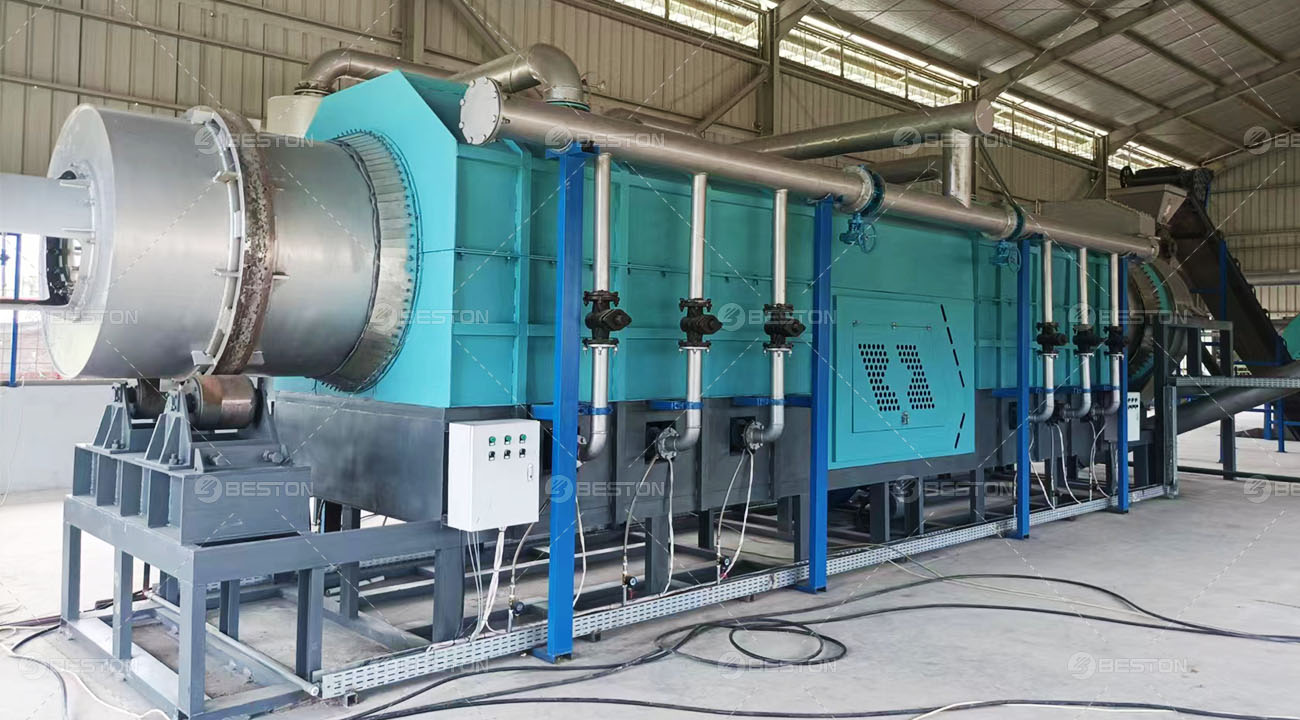Introduction
In the dynamic landscape of sustainable agriculture, the emergence of charcoal making machines signifies a pivotal shift towards circular economy practices. This article delves into the multifaceted role these machines play in redefining agricultural waste management, exploring the damages wrought by traditional approaches, the transformative potential of biomass pyrolysis technology, and the far-reaching benefits of investing in charcoal-making endeavors.

Harms Caused by Traditional Waste Biomass Treatment
The Environmental Toll
Traditional methods of waste biomass treatment, such as open burning and landfill disposal, exact a significant toll on the environment. The uncontrolled release of greenhouse gases, including carbon dioxide and methane, contributes to climate change. Moreover, the ash generated from burning biomass often finds its way into water bodies, compromising water quality and aquatic ecosystems.
Soil Degradation Conundrum
Beyond the atmospheric consequences, the disposal of biomass through traditional means leads to soil degradation. The ash residue from open burning disrupts soil structure and nutrient composition, adversely affecting the health and productivity of agricultural lands. The urgency to break free from these detrimental practices propels us towards exploring alternative, sustainable solutions.
Benefits of Biomass Pyrolysis Technology
A Controlled Transformation
Biomass pyrolysis technology offers a controlled and sustainable alternative to traditional waste biomass treatment. In the biomass pyrolysis plant, organic materials undergo thermal decomposition in a controlled environment, minimizing the release of harmful by-products. The result is the creation of biochar, a versatile and carbon-rich substance with applications ranging from soil enhancement to renewable energy production.
Unlocking Energy Potential
Beyond biochar, biomass pyrolysis produces valuable by-products like syngas and bio-oil. Syngas, a mixture of hydrogen and carbon monoxide, can be utilized as a clean energy source. Bio-oil, on the other hand, holds promise as a renewable substitute for conventional fossil fuels. This dual benefit of waste-to-energy conversion positions biomass pyrolysis as a sustainable cornerstone for agricultural circular economy development.
Emission Reduction
By diverting biomass from traditional disposal methods to biomass pyrolysis, the emission of harmful pollutants is significantly curtailed. The controlled combustion process minimizes the release of particulate matter and noxious gases, resulting in a cleaner and healthier environment.
What is a Charcoal Making Machine?
Engineering the Circular Economy
At the heart of biomass pyrolysis lies the charcoal making machine. This sophisticated apparatus is designed to efficiently convert diverse forms of waste biomass into valuable resources. Through meticulous control of temperature, pressure, and residence time, these machines facilitate the conversion of biomass into biochar, syngas, and bio-oil.
Tailored Pyrolysis Processes
Charcoal making machines come in various configurations, each tailored to specific biomass feedstocks and end-product requirements. The adaptability of these machines ensures optimal resource utilization, making them a cornerstone for sustainable waste management in agriculture.
Scalability for Agricultural Enterprises
From small-scale units suitable for individual farms to larger industrial setups, the scalability of charcoal making machine accommodates the diverse needs of agricultural enterprises. This adaptability empowers farmers and entrepreneurs to embrace circular economy practices without compromising operational efficiency.

The Benefits of Investing in Charcoal Making Machines for Agricultural Development
Economic Viability
Investing in charcoal making machines is not merely an environmental choice; it is a strategic move towards economic viability. These machines unlock new revenue streams by converting waste biomass into valuable products, thus mitigating the costs associated with traditional waste disposal.
Job Creation and Rural Development
The establishment of charcoal production units contributes to job creation, particularly in rural areas where agricultural waste is abundant. This infusion of employment opportunities fosters rural development and empowers local communities, aligning with broader sustainable development goals.
Carbon Sequestration and Climate Mitigation
The production and application of biochar play a pivotal role in carbon sequestration. When incorporated into the soil, biochar not only enhances fertility but also sequesters carbon, mitigating the impact of greenhouse gas emissions. This dual functionality positions charcoal making machines, a kind of biochar production equipment as crucial allies in the global fight against climate change.
Biochar: A High-Quality Organic Fertilizer Additive
Soil Alchemy at Work
Biochar is not merely a by-product; it is a high-quality organic fertilizer additive that revolutionizes soil health. The porous structure of biochar serves as a reservoir for nutrients, fostering a symbiotic relationship with beneficial microbes. This intricate dance between organic matter and soil microorganisms results in improved soil structure, water retention, and nutrient availability.
Tailoring Soil Amendment
The adaptability of biochar as a soil amendment allows farmers to tailor its application to specific soil types and crops. Whether sandy or clayey, acidic or alkaline, biochar proves to be a versatile ally in addressing diverse agricultural challenges.
Sustainable Crop Yields
The incorporation of biochar into agricultural practices translates into sustainable crop yields. By reducing nutrient leaching, enhancing water retention, and promoting microbial activity, biochar contributes to the resilience of crops against environmental stresses, ultimately ensuring food security. The applications of biochar are very diverse. You can contact Beston Group for more information on biochar applications.
Biomass to Biochar: Enabling Circular Economy Development
Closing the Loop on Agricultural Waste
The transformation of biomass to biochar epitomizes circular economy principles. Instead of viewing agricultural waste as a burden, the process of converting biomass into valuable resources completes the waste-to-product cycle. This closed-loop approach aligns with the ethos of sustainable resource management.
Circular Economy Synergies
Beyond the immediate benefits of waste management, the circular economy development enabled by biomass to biochar fosters synergies across various sectors. From energy production to sustainable agriculture and waste reduction, the ripple effects extend to create a more resilient and interconnected economic ecosystem.
Conclusion
In conclusion, the integration of charcoal making machines into agricultural practices represents a leap towards sustainable and circular economies. By addressing the harms caused by traditional waste biomass treatment, leveraging biomass pyrolysis technology, and reaping the benefits of biochar as a high-quality soil amendment, we set the stage for a more harmonious relationship between agriculture and the environment. The circular economy development facilitated by biomass to biochar not only mitigates environmental impact but also propels us towards a future where agricultural waste becomes a cornerstone for sustainable development. As we navigate this transformative journey, the adoption of charcoal making machines stands as a beacon, guiding the agricultural sector towards a greener and more prosperous tomorrow.